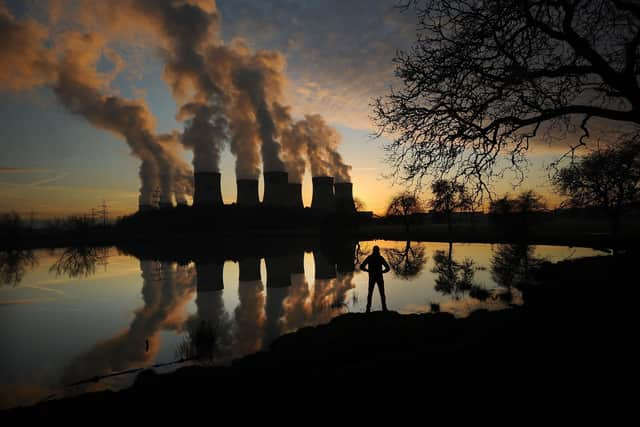Drax CEO says power plant has played a 'critical role' in UK energy supply as doubts raised over firm's green credentials
The group's power station near Selby produces 7 per cent of the UK’s electricity. It announced adjusted EBITDA of £731m for the year ending December 31 2022. This is up from £398m in 2021.
Drax said it had played a significant role in ensuring that energy supply for the country remains secure in a challenging year for the UK’s energy system.
Advertisement
Hide AdAdvertisement
Hide AdIn an interview with The Yorkshire Post, Will Gardiner, CEO of Drax Group, said: “I think 2022 was an important year for two real reasons. One was because Drax played a critical role in ensuring security of supply for the UK. We generated 11 per cent of the UK's renewable power. At times when the wind was not blowing and the sun was not shining, in some days we provided as much as 70 per cent of the UK’s renewable power.


“The other thing I would raise is the other projects we have which are BECCS, and removing carbon permanently from the atmosphere. Globally, the scientific support for those approaches has significantly increased in 2022, and government support has also. We’re absolutely keen to do more of that”
Drax has multi-billion pound plans, backed by the Government, to use Bioenergy with Carbon Capture and Storage (BECCS) at its site, which includes technology intended to capture and store the majority of the CO2 which is emitted through burning biomass. Energy think tank Ember claims that Drax earned government subsidies of £873m in 2020 and £885m in 2021.
The use of biomass as a fuel source has received criticism from a number of groups and figures, including Dr Michael Norton of the European Academies Science Advisory Council, who raised concerns to The Yorkshire Post last year.
Advertisement
Hide AdAdvertisement
Hide AdSpeaking in relation to the broader principle of biomass use, rather than specifically in regards to Drax’s operations, Dr Norton said: “The overall impact of the conversions from coal to biomass have been negative, they have merely sped up climate change rather than delivered the sort of improvements that you’d get if you invest the same amount of money into solar or wind.”
Concerns on this matter were also raised in a Westminster Hall debate last December, when Warrington North MP Charlotte Nichols said the burning of wood produces 18 per cent more CO2 than the burning of coal, according to the Intergovernmental Panel on Climate Change.
Mr Gardiner said he did not agree with these claims, adding: “Biomass is an important source of renewable power which is widely accepted by the UN, and the UK and European governments. Adding carbon capture is widely accepted as a very important source of carbon removals.”
Drax says the use of biomass pellets has reduced its carbon emissions by 80 per cent when compared to coal across the renewable fuel’s life cycle.
Advertisement
Hide AdAdvertisement
Hide AdEarlier this week, workers at Drax’s North Yorkshire site held the first in a series of nine planned strikes over pay disputes. Union Unite said that around 180 staff at the Drax site had rejected a pay increase of 8 per cent, describing the offer as a real-terms pay cut due to inflation.
Mr Gardiner said: “I believe we have offered a fair and generous proposal, we are very open to continuing discussions with them, and we expect to do so. We hope that we can resolve that quickly.”